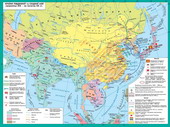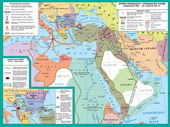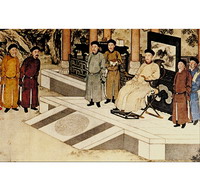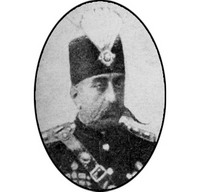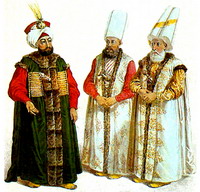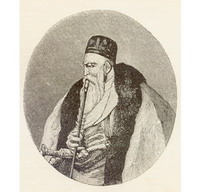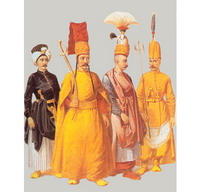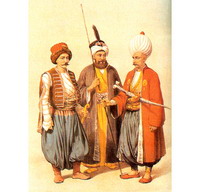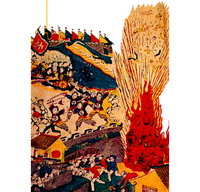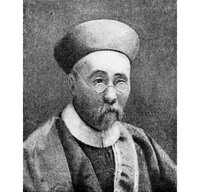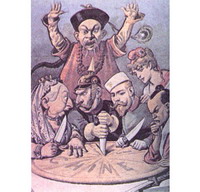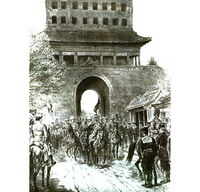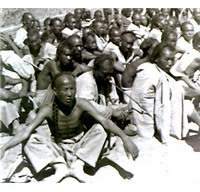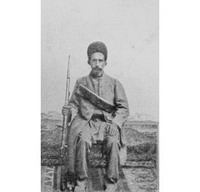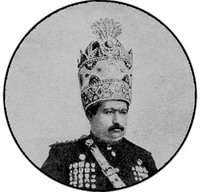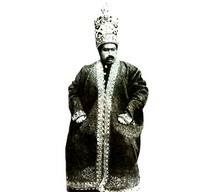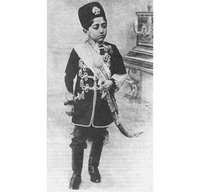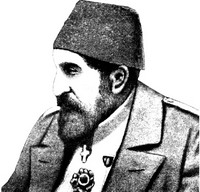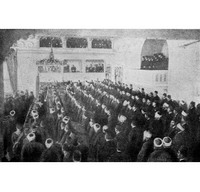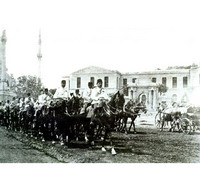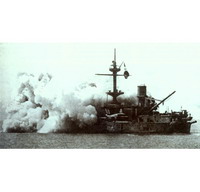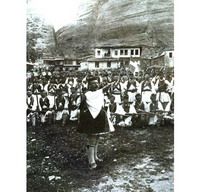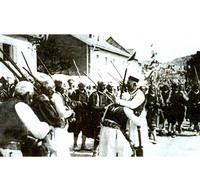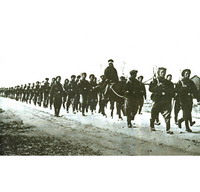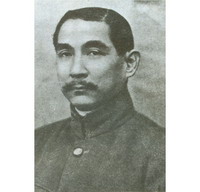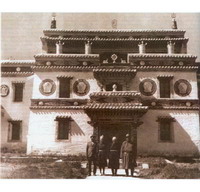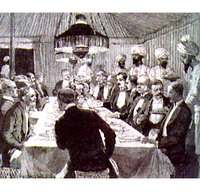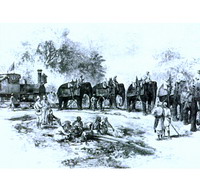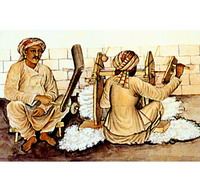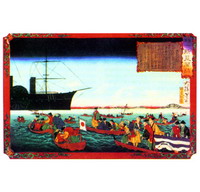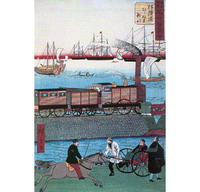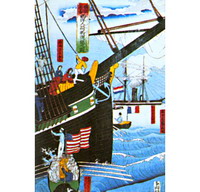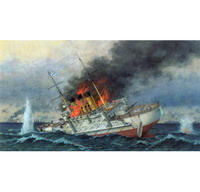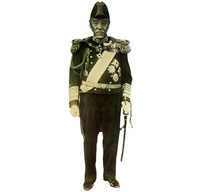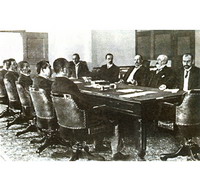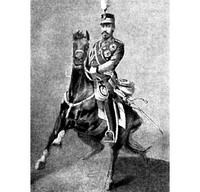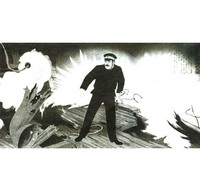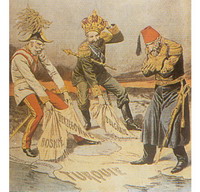In the second half of XIX century. Ottoman empire, Persia (Iran), Siam (Thailand) and China are in napivkolonialnu dependence on large states. They were divided into spheres of influence, and local rulers turned into puppets that are entirely independent of colonialists. Only the rivalry between the great powers prevented from becoming a regular colony of them.
This state of these states made for their forced involvement in the global market that will impact on the domestic life. The traditional economic system and political structure began to collapse quickly. Of course, neither the rulers nor the people did not want to be just spectators, as their fate is decided. The ruling elite understood that this state of affairs lies in the military, and technical backwardness of their countries. They drew on technical advances, the European system pereozbroyuvaly Army created its own industry, tried to fight against some traditions, which, in their view, inhibiting the development of the country.
in the Ottoman Empire has named the following reforms Tanzimat ("transformation") in China - the policy of the self in Iran - Tahi reform Khan.
However, these and other reforms had the desired effect: age-old traditions in no hurry to adapt to a changing world, and the reforms were not consistent. Finally, it ended with the collapse.
failure to confront the ruling European penetration, deterioration of life most of the population, defeat anti-natural performances ("Boxer Rebellion" in China, 1899) stipulated that the struggle led by revolutionaries who adopting various European revolutionary doctrine They tried to raise the peaceful masses to struggle against the colonialists and their supporters in their countries.
Awakening of Asia affected by three revolutions: Iran (1905-1911 biennium), molodoturetskoyu (1908) and Synhayskoyu (1911-1912). Although the latter two won, but the Iranian was defeated, they have led to diametrically opposite effects: the leap from backwardness did not happen, and aroused the masses did not want changes to European such, society has split into two antagonistic camps for the views (by supporters and opponents of change). This has led to new conflicts and revolutions.
Iranian revolution was the first in Asia in the XX century. Its causes are: a sharp decline in living standards and worsening food problems; rule despotic regime Kadzharskoyi dynasty; dominance of foreign capital - especially English and Russian. Large influence on the explosion made a revolution revolutionary events in Russia.
Revolution started in late 1905 mass demonstrations in Tehran, Shiraz, Mashhad and other cities. Under the pressure of people's speeches Shah yielded. October 7, 1906 was convened by the Majlis (parliament), which adopted the constitution.
against deepening revolution jointly by Britain and Russia, who feared losing their positions in the country. So they supported the coup, which made Shah in June 1908 This development only gave new impetus to the revolution. The massive insurgency especially in the north led to the overthrow of Mohammed Ali Shah and restore the constitution. New Ahmed Shah in subsequent transformations sought U.S. support. Reforms that were carried out by American advisers, M. Schuster, helped consolidate the gains of the revolution and regime stability. But it did not suit Britain and Russia, who have resorted to open military aggression. Revolution was suppressed, and Iran has turned into a semi.
At the beginning of XX century. The Ottoman Empire was going through difficult times. After repeated defeats in wars with European powers in the XVIII-XIX centuries. it has lost any impact on world politics. His vast knowledge in Europe, Asia and Africa retain it only because the great powers could not agree on their division. Sultanate has lost credibility.
Under such conditions, there was movement molodoturkiv - young officers, intellectuals - who were indifferent to the fate of the country. Before they set a goal - to restore the constitution of 1876 to reform and modernize the society on the European model.
only thing that has caused disagreement among the participants of the movement - the national question. In addition to the Turkish Empire lived on many other peoples who were subjugated in the past and suffered national oppression.
July 3, 1908 molodoturky revolted. Sultan Abdul-Hamid II hastened to proclaim the restoration of the constitution and gave molodoturkam power. But they dostupyvshys to power, did not rush to reform nepokoyuchys about the possible collapse of the empire. Taking advantage of their inaction, the sultan tried to restore his sole authority, but failed. The new Sultan Mehmed II was.
Molodoturky remained in power until 1918 During his reign, they have not fulfilled promises to modernize the country and get rid of European economic dominance. Instead, only managed to eliminate most barbaric methods of management, initiated a parliamentary and constitutional norms. However, they themselves repeatedly violated them.
to divert popular discontent away, began to inflate molodoturky national hatred, shifting the blame for the failure of Armenians, Greeks and Slavs.
molodoturkiv Authority was also blown up losing the war with Italy (1911-1912) and the Balkan Union (1912).
So molodoturetska revolution in 1908 did not fulfill its main task - modernization of the Ottoman Empire. Empire began to crumble, and its economy was under complete control of foreign capital. Mostly German.
China with its population of many millions and thousand-year history, is especially painful in a country perceived spread of European domination. Manchu dynasty's inability to confront not only Europeans but also Japan. The country began to collapse. Then, led the national liberation movement became revolutionaries led by Sun sen.
revolution began October 10, 1911 in Wuhan (the common name of three towns - Uchan, Hankou, Hanyan) and quickly engulfed the other cities. Manchu dynasty in search of salvation appealed to the General Authority Shikaya Yuan, who was in exile. He agreed, but soon removed from power of the emperor. Power Yuan Shikaya spread north China, supporters of the revolution - to the south. December 29, 1911 in Nanjing delegation revolutionary provinces declared the formation of the Republic of China, the interim president was chosen by Sun sen. Divide the country faces the threat of civil war. To avoid lost power sen Sun Yuan Shikayu, who became president.
China has experienced rapid year which is called the Lunar synhay. Synhayska revolution in China was over. In March 1912 in Nanjing of China adopted the constitution of the republic and decided to move the capital to Beijing.
Awakening affected Asia and India, where a powerful national liberation movement led by the Indian National Congress (INC.), preferred non-violent struggle. Peaceful protest, demonstration, boycott, civil disobedience were not less effective than armed struggle. Its peak in this period was the political strike in Bombay in 1908
special place among the Asian countries occupied Japan. In the middle of the XIX century. after forcible "opening" it faces the prospect of transforming a colony of great powers. However, due to consolidation, reforms that became known as the Meiji Revolution (new rule), Japan has changed dramatically, and the beginning of XX century. itself became part of the great powers. Reforms in Japan accompanied by external expansion. The first victims of Japanese aggression was Korea, which Japan in 1876 has imposed unequal treaty. Further expansion of the Japanese ran to counter China and Russia. Skillfully playing on contradictions in Russia and England, Japan has concluded with the last union. In 1875 between Russia and Japan concluded an agreement under which first went on. Sakhalin, and the second - the Kuril Islands.
abroad in the development of Japan was the Japanese-Chinese war of 1894-1895 years. Having won it, got her first colony of Japan - the island of Taiwan. Indemnity received from China were used to finance a 10-year program to create heavy industry that was to give the new weapon. The navy planned to increase by 4 times, the army in 2 times. Implemented activities have been fruitful, so only 5 years was built 3 thousand new businesses. In 1900 Japan along with other great powers involved in suppressing the uprising Ihetuan ("Boxer Rebellion") in China. The next step in Japan, which has further strengthened its new status, was winning the war with Russia (1904-1905). This victory made it possible to definitively establish themselves in Korea (in 1910 became the colony) and China. Believed in his greatness and invincibility of Japan policymakers are nurturing plans further expansion in the Far East and Pacific Basin.
 English
English
